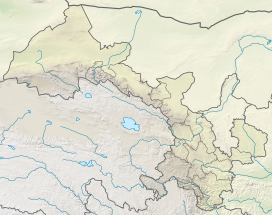Wushao Mountain
 From Wikipedia the free encyclopedia
From Wikipedia the free encyclopedia
| Wushao Mountain | |
|---|---|
| Wushaoling | |
| Highest point | |
| Elevation | 3562 |
| Coordinates | 37°11′00″N 102°53′02″E / 37.1833840°N 102.8838018°E |
| Naming | |
| Native name | 乌鞘岭 (Chinese) |
Wushao Mountain, Wushao Ling Mountain or Wushaoling (simplified Chinese: 乌鞘岭; traditional Chinese: 烏鞘嶺; pinyin: Wūshāolǐng) is a landform in Gansu Province, China, with significant desert elements on its northern slope.
The mountain has been a barrier to transportation since ancient times, when the Northern Silk Road found a passage across its terrain.[1] The western slope of Wushao Ling combined with adjoining slopes of Lanshan Mountain comprises over 30 percent of the desert area of China. Given the current[needs update] trend in China's land use policies, desertification of the Wushao Ling slopes and other Chinese deserts is projected to expand.[2]
The mountain range is crossed by:
- China National Highway 312, through the Wushaoling Pass (3030 m)
- G30 Lianyungang–Khorgas Expressway, through a tunnel
- Lanzhou–Xinjiang high-speed railway, through the Wushaoling Tunnel (21.05 km)
Climate
[edit]Mount Wushao has a subarctic climate (Köppen climate classification Dwc). The average annual temperature in Mount Wushao is 0.3 °C (32.5 °F). The average annual rainfall is 407.3 mm (16.04 in) with July as the wettest month. The temperatures are highest on average in July, at around 11.8 °C (53.2 °F), and lowest in January, at around −11.3 °C (11.7 °F).
| Climate data for Mount Wushao (1981−2010 normals, extremes 1981−2010) | |||||||||||||
|---|---|---|---|---|---|---|---|---|---|---|---|---|---|
| Month | Jan | Feb | Mar | Apr | May | Jun | Jul | Aug | Sep | Oct | Nov | Dec | Year |
| Record high °C (°F) | 9.9 (49.8) | 13.9 (57.0) | 18.7 (65.7) | 22.0 (71.6) | 22.1 (71.8) | 23.2 (73.8) | 28.1 (82.6) | 24.6 (76.3) | 22.3 (72.1) | 19.0 (66.2) | 13.1 (55.6) | 9.9 (49.8) | 28.1 (82.6) |
| Mean daily maximum °C (°F) | −4.9 (23.2) | −3.2 (26.2) | 0.5 (32.9) | 6.3 (43.3) | 11.0 (51.8) | 14.6 (58.3) | 16.7 (62.1) | 15.8 (60.4) | 11.6 (52.9) | 6.2 (43.2) | 1.1 (34.0) | −3.1 (26.4) | 6.1 (42.9) |
| Daily mean °C (°F) | −11.3 (11.7) | −9.7 (14.5) | −5.5 (22.1) | 0.4 (32.7) | 5.5 (41.9) | 9.6 (49.3) | 11.8 (53.2) | 10.6 (51.1) | 6.4 (43.5) | 0.6 (33.1) | −5.1 (22.8) | −9.4 (15.1) | 0.3 (32.6) |
| Mean daily minimum °C (°F) | −16.1 (3.0) | −14.4 (6.1) | −9.8 (14.4) | −4.0 (24.8) | 0.9 (33.6) | 5.1 (41.2) | 7.5 (45.5) | 6.5 (43.7) | 2.7 (36.9) | −3.2 (26.2) | −9.6 (14.7) | −14.3 (6.3) | −4.1 (24.7) |
| Record low °C (°F) | −28.1 (−18.6) | −25.5 (−13.9) | −25.1 (−13.2) | −16.4 (2.5) | −13.7 (7.3) | −3.1 (26.4) | 1.5 (34.7) | −1.1 (30.0) | −6.8 (19.8) | −19.4 (−2.9) | −23.8 (−10.8) | −30.7 (−23.3) | −30.7 (−23.3) |
| Average precipitation mm (inches) | 2.6 (0.10) | 4.8 (0.19) | 12.2 (0.48) | 18.1 (0.71) | 42.0 (1.65) | 64.1 (2.52) | 85.9 (3.38) | 89.0 (3.50) | 61.2 (2.41) | 21.9 (0.86) | 3.8 (0.15) | 1.7 (0.07) | 407.3 (16.02) |
| Average relative humidity (%) | 48 | 53 | 57 | 54 | 57 | 61 | 68 | 71 | 71 | 65 | 50 | 45 | 58 |
| Source: China Meteorological Data Service Center[3] | |||||||||||||
References
[edit]- ^ Silk Road, North China, C.Michael Hogan, the Megalithic Portal, ed. A. Burnham
- ^ Donald A. Wilhite, Drought Assessment, Management, and Planning: Theory and Case Studies, 1993, Springer Publishing, 316 pages ISBN 0-7923-9337-6
- ^ 中国地面气候标准值月值(1981-2010) (in Chinese (China)). China Meteorological Data Service Center. Retrieved December 15, 2022.


